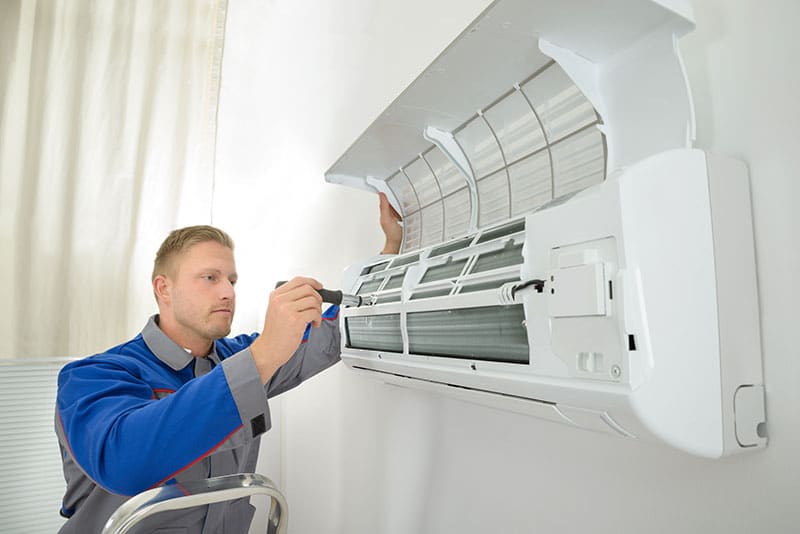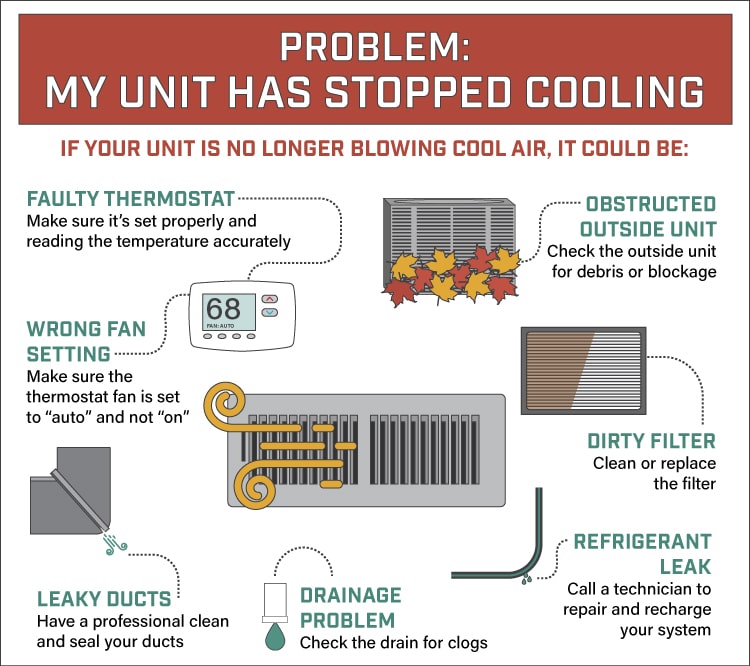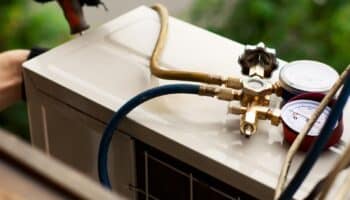We've independently reviewed this article to make sure it's as accurate as we can make it.
To find out more about our article creation and review process, check out our editorial guidelines.
Unwinding in the arctic blast of a well-running air conditioner is one of the great luxuries of the summertime.
Meanwhile, a lukewarm weak breeze from the vent on a hot summer day is one of life’s greatest disappointments. We want to keep our AC in tip-top shape so we can chill out during these burning months.
You don’t always need a new air conditioner to stay cool. By running your AC at strategic times, using fans to circulate air, and by keeping up with your air conditioner’s maintenance, you can make a noticeable difference in your home’s temperature.
Read on to find out the methods that can keep your air conditioner working well.
Why Is My AC Not Cooling Enough?
If your air conditioner isn’t giving you the relief you’re looking for, there could be a few reasons. Assuming your AC is properly sized for the home or room you’re using it in (more on that later), the problem could come from a few sources. You might be able to fix it by using your AC a little differently, it might be a maintenance issue (not necessarily major), or it might even just be the weather.
Whatever it is, this guide will show you how to find out what’s keeping your AC from giving you your cool and show you how to fix it!
The first thing we’ll cover is how you can improve your AC experience even if it’s running as well as it can. This can be as simple as cleverly programing the thermostat and breaking out a fan. Between these two strategies, you can feel a whole lot cooler without breaking the bank.
- Set your programable thermostat to start cooling about half an hour before you come home: There’s nothing like walking into a cold cushion of air after a hot day to help you feel that difference.
- Leave your AC running during short errands: Even better, it takes a lot of energy to cool down your house, but not as much to keep it cool. That means that you won’t be using that much more energy to do this.
- Break out the fan: Using a fan as well as your air conditioner can help you feel cooler at higher temperatures, saving a lot of money while raising comfort. Air conditioners cool down the air, but the fan helps circulate it, helping heat escape from your body.
- Run as cold as ice by using ice: It may sound like a low-tech solution, but this strategy is a classic for a reason! Just putting a bucket of ice under your vent (or even in front of your fan) can make a big difference on how the air feels. Just be sure to dump it or refreeze it when you’re done! A humid room will feel hotter at lower temperatures.
With these tricks, you can enjoy a cooler sensation from the moment you walk in the door. If that doesn’t get you the cold you need, it’s time to take a look at the condition of your air conditioner.
Intimidating as it might first sound, you don’t have to be an air conditioner repair specialist to perform a quick examination of the unit. While an annual checkup by a professional is the best way to keep your air conditioner running well and running long, there are a few things that even an appliance amateur can take care of themselves!
- Change (or clean) your filters: The number one cause of air conditioner malfunction is a dirty filter. An air conditioner’s filter should be checked every few months. Once there’s enough dust on it to obscure light (just a thin layer), you need to replace or clean it. Only clean filters that are labelled as washable.
If you want to get any replacement part – or see how much one would cost – click to enter your model number in the search bar below. Our partners at AppliancePartsPros stock almost every part with free guides on how to install them.

- Unblock that airflow: Even if the filter is letting air through, anything cluttering the area around your vents or the AC’s intake can have a similar effect, slowing air and forcing your AC to work harder. Check to see if this is hampering your unit.
- Check your coils: An air conditioner has two sets of coils. The internal set (“evaporator coils”) takes heat from the air and pulls it outside, and the external set (“condenser coils”) releases that heat into the outdoor air. A layer of dust or dirt on these functions like a blanket, hampering their work. You can clean this yourself. If there’s ice, you may have a bigger problem.
- Get out of the sun: The sun is the great equalizer. Being in bright sunlight makes you hot, and it does the same to your AC. If your air conditioner spends a lot of the day sitting in direct sunlight, you can improve its performance and longevity by making some shade for it (or moving it if it’s a more portable window unit).
- Don’t try to hear it: Air conditioner leaks are often micro-leaks, and are practically silent. Focus on the other tips to find the issue, and don’t get caught up listening for a hissing like a deflating tyre.
This short checklist can solve a whole lot of problems, and catch some more serious ones before they get bad. But there’s a few things that can still be causing trouble.
If the weather has been extremely hot, sometimes air conditioners can’t cool the house down to the point you want it. A typical air conditioner can’t lower the temperature by much more than 20℉. If it’s a hundred and twenty degrees for a few days, it won’t be chilly inside no matter how long the AC runs.
Even if the weather’s cool, there are still limits to how large of an area an AC can cool. Hopefully, your central air is well sized for your home (a professional can check for you). A window air conditioner, however, comes with a recommended square footage.
If you try to cool a three room apartment with an AC sized just for the bedroom, you won’t get the cool you’re looking for.
Signs You Need a New Air Conditioner
Sometimes, even when you do everything right, time itself works against you. An air conditioner can’t live much more than 20 years in the best conditions. There are a few ways to tell if it’s time to let yours go to the great appliance store in the sky.
There are three things to look out for: utility bills creeping up, cooling speed and ability winding down, and new noises.
Older air conditioners are less efficient than new ones, but in its final stretch, an air conditioner starts deteriorating noticeably. Keep an eye on your summer utility bills. If they’ve been going up and the weather isn’t unusually warm, you AC might be about done.
At the same time, this high energy usage is less effective, and your air conditioner will start running longer, even though it leaves your house warmer. If a poorly-cooling AC is a new complaint for you and you can’t solve it with maintenance, it might be time to look for a new one.

Weird noises come in three varieties. Most noises just are a sign of age and can be considered warnings, but nothing dire. Hissing, even when the AC is off, can be a sign of a refrigerant leak, an urgent issue which only a professional can fix.
If you hear a sharp shrieking, turn off the AC and get help right away. That’s a sign that the expensive compressor has a problem. Left unchecked, it can become serious.
If your AC isn’t doing its job anymore, it’s time to get a replacement. Don’t fret! Technology has advanced a lot in the past ten years alone. Your new AC could end up saving you money. Check out the Energy Star ratings when you buy, and make sure to check out our guides to the quietest portable air conditioners as well as the quietest window air conditioners!
Conclusion
Like all things, air conditioners have their limits, but that doesn’t mean you can’t enjoy the sweet, shivery bliss of a cool home. By using your AC wisely, keeping up on its maintenance, and watching out for a few pitfalls, you can have the coolest home on the block!
Thank you for reading this article! For more on your air conditioner and surviving the summer, check out our related articles below!








